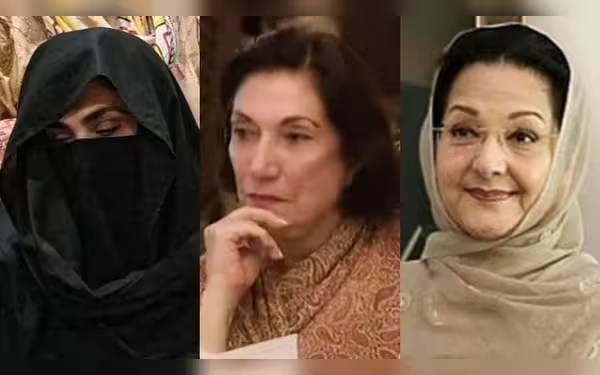Saturday, December 21, 2024 04:02 PM
Bushra Bibi: A New Era for First Ladies in Pakistan
- Bushra Bibi advocates for Imran Khan's release.
- Comparison with Nusrat Bhutto and Kulsoom Nawaz.
- PTI faces internal challenges amid political turmoil.
 Image Credits: geo
Image Credits: geoBushra Bibi leads a movement for Imran Khan's release, drawing comparisons with past first ladies Nusrat Bhutto and Kulsoom Nawaz.
In the political landscape of Pakistan, the role of first ladies has often been pivotal, especially during times of crisis. Bushra Bibi, the third former first lady of Pakistan, is currently at the forefront of a movement advocating for the release of her husband, Imran Khan, the founder and chairman of the Pakistan Tehreek-e-Insaf (PTI). This situation draws a compelling comparison with the struggles faced by previous first ladies, Begum Nusrat Bhutto and Begum Kulsoom Nawaz, who also fought for their husbands during tumultuous times.
Bushra Bibi's journey began when she married Imran Khan in 2018, shortly after her divorce from bureaucrat Khawar Maneka. That same year marked a significant turning point for Khan, as he became the Prime Minister of Pakistan after a long political struggle. However, the political tides turned in 2022 when Khan lost his position due to a no-confidence vote, leading to a series of events that saw him and Bushra facing legal challenges, including convictions in various cases.
As Bushra Bibi leads the charge for her husband's release, it is essential to reflect on the historical context of her predecessors. Begum Nusrat Bhutto, who led the Pakistan Peoples Party (PPP) after her husband, Zulfikar Ali Bhutto, was arrested and later executed in 1979, faced immense challenges. She mobilized the party and fought against a powerful military regime, enduring personal tragedies, including the loss of her children. Her resilience during this dark period is a testament to her strength as a leader.
On the other hand, Begum Kulsoom Nawaz took the reins of the Pakistan Muslim League-Nawaz (PML-N) after her husband, Nawaz Sharif, was ousted in a military coup in 1999. Kulsoom's leadership was marked by her determination to keep the party united and active in the face of adversity. Unlike Bushra, who currently enjoys state protocol and security in Khyber Pakhtunkhwa, both Nusrat and Kulsoom operated without such privileges during their respective struggles.
In recent events, Bushra Bibi's leadership has faced scrutiny. During a protest on November 24, 2023, PTI workers expressed their frustrations towards her and other party leaders, accusing them of being disconnected from the grassroots movement. This incident raises questions about her ability to galvanize support and effectively lead the party in these challenging times.
As Bushra Bibi continues her efforts to advocate for her husband, the comparisons with Nusrat Bhutto and Kulsoom Nawaz serve as a reminder of the complexities involved in political leadership, especially for women in Pakistan. Each of these women has faced unique challenges, yet their stories reflect a common thread of resilience and determination.
The political journey of Bushra Bibi is still unfolding, and only time will tell if she can match the legacy of her predecessors. The struggles of Nusrat and Kulsoom provide valuable lessons in leadership, perseverance, and the importance of staying connected with the people. As the political landscape continues to evolve, the role of first ladies remains crucial in shaping the narrative of their respective parties and the nation as a whole.













